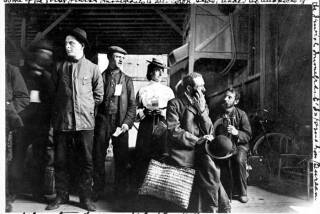IMMIGRANTS / INFLUX INTO ISRAEL : Tough Times Greet Town’s Newcomer
- Share via
OFAQIM, Israel — Raisa Friedman arrived in Ofaqim, a depressed textile town amid the wheat fields of Israel’s Negev region, with a suitcase and hopes for a new life far from her Soviet home.
Newcomers to Ofaqim are rare. More than a few people have moved on for lack of work. But even so, Friedman’s arrival took the town by surprise. According to local officials, no one from the Absorption Ministry, which is in charge of dispersing the huge wave of Soviet immigrants to homes throughout Israel, had bothered to call ahead to tell them that Friedman was coming.
So, when the energetic 69-year-old woman arrived, there was no one to greet her and no place to house her. She was shunted from City Hall to a local housing agency and back again before it was decided to put her up in a home for the elderly.
“I wanted to stay in Tel Aviv,” Friedman told a visitor in her temporary cubicle, “but the ministry said there was no room there. Then they sent me here. Plenty of room, but no house.”
The Friedman case has become a cause celebre in the Israeli press as complaints are aired that the government is not prepared to deal smoothly with the newcomers. A surplus of rental units is shrinking, raising the possibility that new arrivals will have to be put up in tent cities.
The problem has been brought on by the quickening influx of immigrants. More than 10,000 arrived in April alone; more than 30,000 have immigrated so far this year. About 12,000 arrived in all of 1989. Last weekend, Israel’s Treasury Ministry estimated that 150,000 Soviets will settle in Israel during 1990. But the government has made budget plans for only 40,000.
In the meantime, a prolonged political crisis is complicating efforts to arrange housing, training and jobs for the newcomers. Acting Cabinet ministers have been preoccupied with back-room meetings to organize a new governing coalition.
Officials of the Jewish Agency, which raises money to help immigrants, predict that within six months there will be no rental housing available and that temporary shelter will have to be found. The government says 10,000 units are under construction and that 5,000 will be started in June.
In the coastal town of Netanya, immigrants protested in the streets last week because they had to stand in long lines for everything from welfare checks to advice on schooling.
Members of the Knesset, the Israeli Parliament, charge that a direct-deposit plan for immigrant subsidy checks has been tied up in the Absorption Ministry for months. The ministry and the Jewish Agency have yet to agree on which banks to use.
The snags come to light at a time when the government is preparing to ask world Jewry to increase donations for settling Soviet Jews in Israel.
Ofaqim had hoped to benefit from the influx of Soviet immigrants. It is a town that was created to house new immigrants in the 1950s, when Israel was trying to develop urban centers in the south and north, away from the popular coastal strip.
The textile industry has been a mainstay of Ofaqim’s economy, but in recent years competition from East Asia, and the inefficiency of government-owned operations, has forced several factories in the area to close. The population is now about 14,000, and unemployment is about 15%.
So, it caused some embarrassment when the first immigrant to arrive, Raisa Friedman, ran into difficulties.
“Even in the ‘50s, the government was better organized,” said Avi Bitan, a spokesman for the city government. “They sent this woman out here like an astronaut. It was a complete surprise.”
An Absorption Ministry spokesman said authorities in Ofaqim were notified but failed to act.
Friedman seems nonplussed by the uproar she has caused, and a little pleased.
A widow, she left the Soviet Union two months ago. Ethnic tension was growing in her hometown, Tashkent, directed not only against Jews but against any “foreigners” in the region, including Russians.
“There were rumors that there would be trouble,” she said. “I did not want to wait.”
More to Read
Sign up for Essential California
The most important California stories and recommendations in your inbox every morning.
You may occasionally receive promotional content from the Los Angeles Times.












